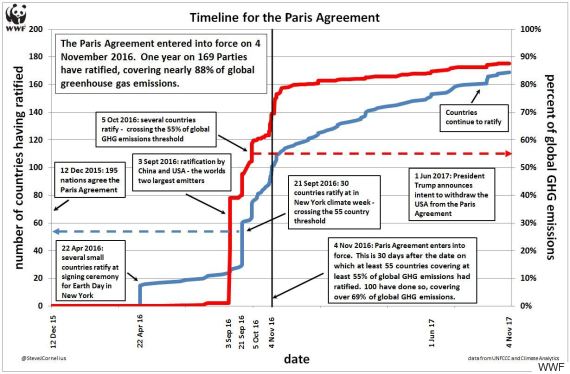“Bula” is a Fijian greeting; it means “hello”, but also means “life” and being alive. Today in the German city of Bonn, Fiji takes over the Presidency of COP. COP, or the Conference of the Parties, is the UN’s annual climate change summit – following on from COP22 in Marrakech and COP21 in 2015 when the ground-breaking Paris Agreement was born. The Paris Agreement committed to collective leadership and shared responsibility to solve the climate change challenge. Now, almost two years after the Paris Climate Agreement was reached, its time to turn pledges to climate action and reduce our carbon emissions for a 1.5°C future.
In Paris, countries said they would do a whole host of important (but mainly) technical things by 2018 to ensure that global temperature rise was limited to well below 2°C with efforts towards 1.5°C. Over the next two weeks COP23 aims to progress these – including more clarity on the rules to implement the Paris Agreement and the design of the 2018 “Talanoa dialogue” on how the necessary tightening of countries’ emissions reduction targets will work. “Talanoa” is derived from “tala” meaning “talking or telling stories,” and “noa” meaning “zero or without concealment” – so a frank and open dialogue.
2017 has seen unprecedented extreme weather events – from the deadly monsoonal flooding in South-Asia, to hurricanes such as Harvey, Irma, Jose and Maria flattening cities in the Caribbean and US, and the “Lucifer” heatwave in Europe. The science is increasingly clear that the increased likelihood and severity of these extreme weather events can be attributed to climate change. There is demand for urgent climate action from communities across the world, especially those whose lives and livelihoods have been impacted. This urgency needs to be felt in the negotiations.
Two events in the climate world happened on Saturday, 4th of November. First, it was the one-year anniversary of the Paris Agreement becoming international law- the Agreement has been ratified by 169 countries and covers almost 88 per cent of global greenhouse gas emissions. Second, the climate march in Bonn saw an estimated 25,000 people call for the end to coal-fired power (coal is the most polluting fossil fuel and the main source of electricity in Germany) Rapidly removing coal from the energy mix and replacing with renewable energy is crucial to reducing carbon dioxide emissions and limiting global temperature rise to 1.5°C. Some countries are starting to commit to phase out coal power, including the UK and Italy by 2025 and Canada the Netherlands by 2030. Other countries, such as China and India, are delaying or cancelling planned coal-fired power stations as they seek to cut pollution and are instead turning to cheaper renewable energy sources like solar.

The UN Environment Programme’s Emissions Gap Report 2017 looks at the gap between the current country pledges and the total emissions reductions needed to limit temperature rise to 2ᵒC. It finds significant potential for this gap to be closed if contributions from businesses, cities, sub-national governments, civil society, investors, and many others are made. Efforts by these groups are collectively referred to as the Action Agenda, and COP23 will have a significant focus on them. WWF itself will be hosting important discussions and events with many groups at COP23 (see www.panda.org/cop23).
Climate action is happening. For example, record amounts of renewable energy generation are being built worldwide as their costs continue to fall, and most vehicle manufacturers have indicated that they will bring out fully electric models in the near future.
This is the good news.
The bad news is that much more needs to be done. We are not yet on a path that will see us limit to 2°C warming let alone the target of 1.5°C that is essential if we are to avoid the worst impacts of climate change. To do this, we need bold leadership, political will and further ramping up of climate action.
Every nation also has a part to play. The UK Government needs to be doing more as a global leader on climate action – for example through more energy-efficient houses, more renewable energy and a faster rollout of electric vehicles. Last month the UK Government outlined its plan to reach its current targets to 2030 in the Clean Growth Strategy. Worryingly, the strategy won’t actually get us all the way to the targets we’ve already agreed to 2030, let alone the more ambitious targets we’ll need to set to meet the Paris agreement.
As COP23 kicks off today it is important that the frank and open “talanoa” spirit infuses the discussions to ensure our ambition for a 1.5°C future is reached.
Bula from Bonn.






